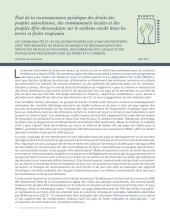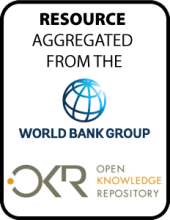Land Library Search
Through our robust search engine, you can search for any item of the over 73,000 highly curated resources in the Land Library.
If you would like to find an overview of what is possible, feel free to peruse the Search Guide.
/ library resources
Showing items 1 through 9 of 29.Land corruption – corrupt practices in the land sector – threatens the lives and livelihoods of people and communities, the environment and climate, food security and political stability. Its impacts are particularly acute for 2.5 billion people who live on and from the land.
L’étude a analysé dans 31 pays l’état de la reconnaissance juridique des droits des peuples autochtones, des communautés locales et des populations afro-descendantes sur le carbone présent sur leurs terres et territoires.
The impending close to the war in Syria brings to the fore the prospect of approximately 13 million forcibly displaced people considering returns to places of origin in the country.
IN’s latest resource is an introduction to the topic Land and Water Grabbing: A discussion of integrity implications and related risks, which discusses the integrity implications and risks of land and water grabbing.
This issue includes the following
headings: Changes in Poverty and Female-Headed Households in
Africa; Growth and Capital Inflows in Africa; Growth and
Capital Inflows in Africa; Vulnerability to Climate Change
This paper brings together sociological
theories of culture and gender to answer the question – how
do large-scale development interventions induce cultural
change? Through three years of ethnographic work in rural
The Country Opinion Survey in Côte
d’Ivoire assists the World Bank Group (WBG) in gaining a
better understanding of how stakeholders in Côte d’Ivoire
perceive the WBG. It provides the WBG with systematic
The Country Opinion Survey in Bolivia
assists the World Bank Group (WBG) in gaining a better
understanding of how stakeholders in Bolivia perceive the
WBG. It provides the WBG with systematic feedback from
Women in post-conflict economies face a
number of challenges. Often their businesses stay at
embryonic stages only, due to three key limitations relating
to: knowledge of business vision and management; access to





